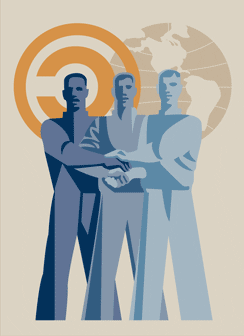Há tempos não lia um texto tão divertido. Mesmo sendo sério e tratando de algo sério! Toca no tema 'Convergência' que tratei no graffiare speciale #03 e #04. Mas vai além. Muito além. Trata-se da tática do 'Império do Mal' e sobre como a IBM pode salvar o universo... Saca só (é meio extenso, mas vale a leitura):
That works in two ways that again can be separated into hardware and software. Selling its PC division gives IBM some distance from Microsoft and takes away from Redmond a few of its favorite weapons. First, there is the denial of a Windows OEM license, which Microsoft loves to threaten. "Do what we want the way we want it or we MAY decide not to renew your Windows OEM license" is the way that one goes. No desktop vendor can afford to risk its Windows license, so they all comply with whatever Microsoft wants, which is the essence of monopoly control and remains essentially unchanged since the company's settlement with the U.S. Department of Justice. But by selling to Lenovo, IBM no longer needs a Windows OEM license, so that power over IBM is gone. Lenovo needs a license, but China is a market that Microsoft covets, so they can't afford to push Lenovo around as much as they could a traditional U.S. supplier. And even if Microsoft did deny Lenovo the license, IBM could always just buy its boxes from some other company that does have a license.
Microsoft is also on a tear lately to sign patent cross-licensing deals with all its major OEMs. This is part of a new concentration on intellectual property in which Microsoft is patenting everything it can think of, and a lot of things already thought of long before by other people at other companies. By cross-licensing, Microsoft gains access for free to all the neat stuff at its OEMs while simultaneously positioning itself to concentrate its own IP enforcement actions on smaller competitors, in the belief that if anyone is going to eventually take down Microsoft, it will be a startup. In this Christmas season think of this as Gates and Ballmer emulating King Herod, who ordered that all male children under the age of three be killed.
By selling its PC division, IBM opts out of the class of companies over which Microsoft has power to coerce such an agreement. Given that IBM holds more patents than any other company, this has to hurt Microsoft
.
The hardware implications of this deal for Microsoft are also interesting. Many readers pointed out to me this week that the next version of Microsoft's xBox game system will use a PowerPC processor, and that the development system for game companies targeting xBox 2 is actually an Apple G5 Mac. Microsoft made this design decision not to throw the fear of Bill (FoB) into Intel, which produces the current xBox processor, but for simple performance: xBox couldn't stick to an Intel processor and be competitive with future Sony and Nintendo game consoles. So at a time when IBM is pulling away from Microsoft influence, Microsoft is, itself, coming more under the influence of IBM.
This double shifting has a lot of importance to both companies, and it is to their credit, I suppose, that they are even thinking this far in advance, because where it reaches critical mass will be in the xBox3, Bill's ultimate creation.
Take a long look at xBox development, the evolving PC and consumer electronics markets, and Microsoft's own need for revenue growth, and figure what that means for the xBox 3, which should appear around the end of this decade. My analysis suggests that xBox 3 will be a game system that's also a media receiver and recorder and a desktop workstation. Not that you'd use one box for all three things, but that you'd buy three essentially identical boxes and use them for all three functions. And of course you'd buy extra units for kids and spare TVs, etc. In short, xBox 3 will be Microsoft's effort to extend its dominance of the PC software industry into dominance of the PC hardware, game, and electronic entertainment industries. At that point, even mighty Dell goes down.
I know some people think Microsoft actually plans a PC version of xBox 2 (not 3), but as I explain in this week's links, I think that is unlikely to see daylight.
With its continual need for more revenue, Microsoft will by then have already finished its destruction of the world software market, will have sucked all the profit out of the world hardware market, and will discard its hardware OEMs like HP and Dell and compete with them head-to-head. And they'll be doing the same for DVDs, TVs -- even mobile phones. Of course, part of the plan is for all the content coming to those devices to throw off little revenue streams to Microsoft, too. And the software that holds it all together will be rented, rather than owned or even traditionally licensed. This would give Microsoft both the deterministic revenue stream it covets and the leverage of being able to threaten to turn off the tap and thereby maintain control over, well, all of us. It will be an effective five to 10 percent tax on global income that suddenly appears one day, and academics will call it a natural monopoly.
Fortunately -- and I can assure you I never thought I would ever in my life be writing this -- IBM may save the day.
By maintaining independence from Microsoft and actually making Microsoft dependent on it, IBM can have some influence on this diabolical scheme. They could foster alternate standards and, by doing so, make a good living. Let's just hope the two companies don't decide to simply share the booty and jointly enslave us, couches, potatoes, and all.
Q beleza! O texto integral, de Robert X. Cringely (não sei quem é o cara), tá aqui. Divirta-se! Leia depois suas previsões para 2005.
























